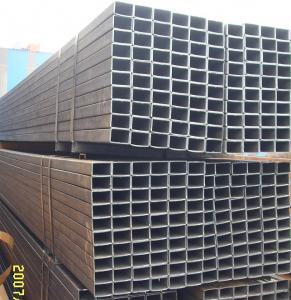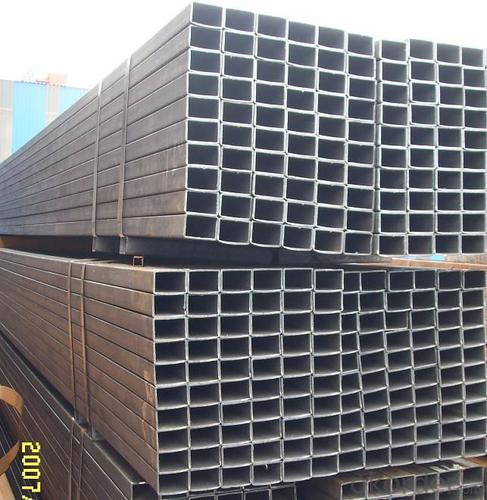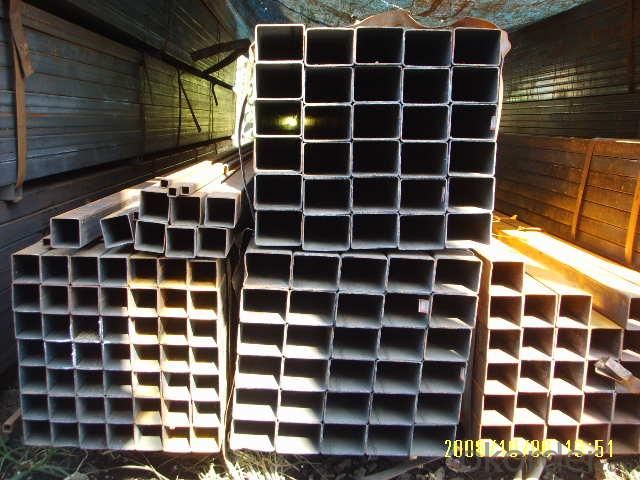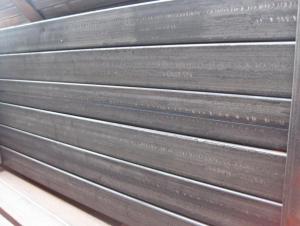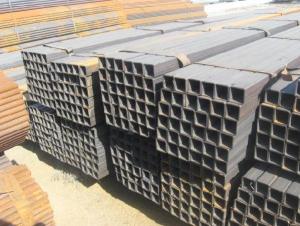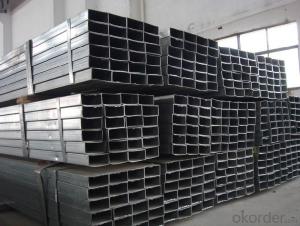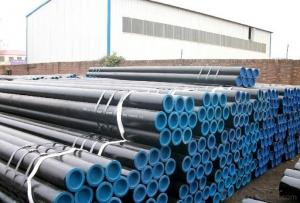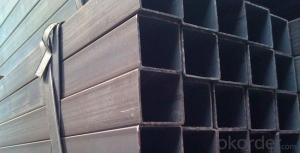Hollow Section Steel Tubes(Hot Rolled/Cold Rolled)
- Loading Port:
- China Main Port
- Payment Terms:
- TT or L/C
- Min Order Qty:
- 50MT m.t.
- Supply Capability:
- based on order m.t./month
OKorder Service Pledge
OKorder Financial Service
You Might Also Like
Hollow Section Steel Tubes(Hot Rolled/Cold Rolled)
Application of Hollow Section Steel Tubes(Hot Rolled/Cold Rolled)
It is widely used in building, machine, chemical equipment, automobile industrial, container, it is also applied to agriculture and mine machine.
ASTM A500, GB6728
Steel grade of Hollow Section Steel Tubes(Hot Rolled/Cold Rolled)
ASTM A500: A, B, C
GB6728:Q195,Q215,Q235,Q345
Size of Hollow Section Steel Tubes(Hot Rolled/Cold Rolled)
*Remark: Besides below sizes, we also can arrange production based on requirement of customers
Sizee(mm) | Thickness(mm) |
20×10 | 0.6-1.0 |
25×12 | 0.6-1.0 |
38×19 | 0.6-1.5 |
50×25 | 0.6-1.5 |
50×30 | 1.6-3.0 |
60×40 | 1.5-3.5 |
75×50 | 1.5-4.0 |
80×40 | 1.5-4.0 |
100×50 | 2.0-6.0 |
100×60 | 2.0-6.0 |
100×75 | 2.0-6.0 |
120×60 | 3.0-6.0 |
120×80 | 3.0-6.0 |
125×50 | 3.0-6.0 |
125×75 | 3.0-6.0 |
150×50 | 3.0-6.0 |
150×75 | 3.0-6.0 |
150×100 | 4.0-12 |
160×80 | 4.0-6.0 |
175×100 | 4.0-12 |
200×100 | 4.0-12 |
200×150 | 4.0-12 |
250×150 | 5.0-12 |
300×200 | 5.0-12 |
400×200 | 5.0-12 |
Chemical Composition(%)
Chemical Requirement | ||||
| Composition % | |||
Grade A | Grade B | |||
Heat | Product | Heat | Product | |
Element | analysis | analysis | analysis | analysis |
Carbon max | 0.26 | 0.3 | 0.22 | 0.26 |
Manganese max | … | … | 1.4 | 1.45 |
Phosphorus, max | 0.035 | 0.045 | 0.03 | 0.04 |
Sulfur max | 0.035 | 0.045 | 0.02 | 0.03 |
Copper, when copper steel is specified, min | 0.20 | 0.18 | 0.2 | 0.18 |
Where an ellipsis (...)appears in this table, there is no requirement | ||||
For each reduction of 0.01 percentage point below the specified maximum for carton, and increase of 0.06 percentage point above the specified maximum for manganese is permitted, up to a maximum of 1.50% by heat analysis and 1.6% by product analysis | ||||
Mechanical Properties
Tensile Requirement | ||
| Grade A | Grade B |
Tensile strength, min, psi (Mpa) | 48000 (400) | 70000 (483) |
Yield strength, min, psi (Mpa) | 36000 (250) | 50000 (345) |
Elongation in 2 in. (50.8mm), min, % | 23 | 23 |
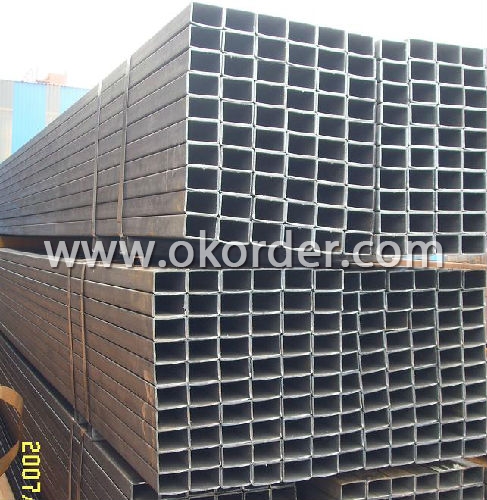
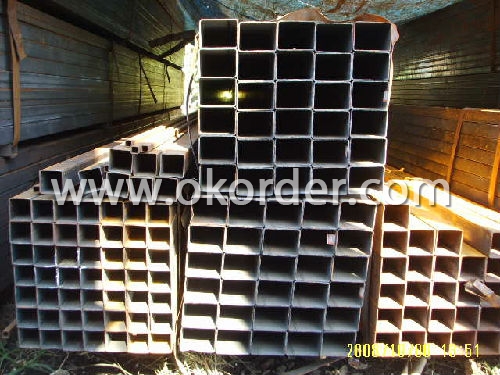
- Q: How are steel pipes used in the manufacturing of wastewater treatment systems?
- Steel pipes are used in the manufacturing of wastewater treatment systems for various purposes such as carrying and transporting wastewater, providing structural support to the system, and facilitating the flow of water and chemicals throughout the treatment process.
- Q: What are the different types of joints used with steel pipes?
- There are several types of joints commonly used with steel pipes, depending on the specific application and requirements. Some of the most common types include: 1. Butt Joint: This is the most basic type of joint, where two pipes are aligned and welded together at their ends. It provides a strong and continuous connection but may require additional reinforcement depending on the pipe's size and pressure rating. 2. Socket Weld Joint: In this type of joint, one pipe is inserted into the socket of another pipe and then welded together. It is commonly used in smaller diameter pipes and provides good strength and leak resistance. 3. Threaded Joint: This joint involves screwing together two pipes with threaded ends. It is commonly used in low-pressure applications and requires the use of pipe threads and sealants to ensure a tight and leak-free connection. 4. Flanged Joint: With a flanged joint, two pipes are connected by bolting together flanges at their ends. This type of joint is commonly used in high-pressure applications and allows for easy disconnection and maintenance. 5. Grooved Joint: This joint uses a grooved coupling that is placed around the ends of two pipes and secured with bolts. It is commonly used in fire protection systems and offers quick installation and easy maintenance. 6. Welded Joint: In a welded joint, two pipes are fused together using various welding techniques such as gas tungsten arc welding (GTAW) or gas metal arc welding (GMAW). This joint provides a strong and permanent connection but may require skilled labor and additional equipment. Each type of joint has its advantages and limitations, and the selection depends on factors such as pipe size, pressure rating, application, and installation requirements. It is essential to choose the appropriate joint to ensure the integrity and reliability of the steel pipe system.
- Q: How are steel pipes used in the manufacturing of offshore wind turbines?
- Steel pipes are used in the manufacturing of offshore wind turbines for various purposes. They are commonly used to create the foundation structures, such as monopiles and jacket structures, which provide stability and support for the turbines in the seabed. Steel pipes are also utilized for the construction of the tower and nacelle structures, providing a strong and durable framework for the turbine components. Additionally, steel pipes are employed for the installation of subsea cables, allowing for the transmission of electricity generated by the turbines to the shore. Overall, steel pipes play a crucial role in the manufacturing of offshore wind turbines by providing the necessary strength, stability, and infrastructure required for their operation.
- Q: How do you calculate the stress in a steel pipe?
- When calculating the stress in a steel pipe, it is necessary to take into account the steel's material properties and the external forces acting upon the pipe. The stress in the pipe is typically determined using the following equation: Stress = Force / Area Initially, the force acting on the pipe must be established. This force may stem from external loads such as pressure, weight, or mechanical forces. The force can be calculated by multiplying the pressure or weight by the surface area it acts upon. For instance, if the pipe is subjected to internal pressure, the force can be determined using the equation: Force = Pressure x Area Subsequently, the cross-sectional area of the pipe needs to be determined. The cross-sectional area of a circular pipe can be calculated using the formula: Area = π x (Diameter / 2)^2 Once the force and area have been determined, the stress can be calculated by dividing the force by the area. This calculation will yield the stress value in units like pounds per square inch (psi) or newtons per square meter (Pa). It is important to bear in mind that the stress calculation assumes that the pipe is in a state of equilibrium and that the material properties of the steel are known. The material properties, such as yield strength and ultimate tensile strength, are utilized to ensure that the calculated stress does not exceed the steel's maximum capacity.
- Q: What are the main aspects of precision steel tubes?
- Its inside and outside diameter size can be accurate to less than 0.2mm, and it is widely used in the manufacture of precision machinery parts and engineering structure when the bending resistance and torsion strength are the same. It is also used to produce all kinds of conventional weapons, guns, shells, bearings and so on.
- Q: How can steel pipes be protected from corrosion?
- Steel pipes can be protected from corrosion through various methods such as applying protective coatings, using cathodic protection techniques, implementing proper maintenance and inspection procedures, controlling water chemistry, and utilizing corrosion inhibitors.
- Q: How do steel pipes perform in marine environments?
- Steel pipes perform well in marine environments due to their high strength and corrosion resistance. The protective oxide layer formed on the surface of the steel helps prevent rust and deterioration caused by salty sea air and water. Additionally, steel pipes can withstand the high pressure and temperature fluctuations commonly found in marine applications, making them a reliable choice for transporting fluids and gases in offshore structures, ships, and other marine installations.
- Q: How are steel pipes inspected for quality?
- Steel pipes are inspected for quality through a rigorous process that involves various techniques and standards. One common method is visual inspection, where trained professionals examine the pipes for any visible defects such as cracks, dents, or surface irregularities. This visual inspection ensures that the pipes meet the required specifications and are free from any visible flaws. Additionally, non-destructive testing (NDT) methods are employed to evaluate the internal and external quality of the steel pipes. One widely used NDT technique is ultrasonic testing, which involves sending ultrasonic waves through the pipes to detect any internal defects or inconsistencies in the material. This method can identify issues like wall thickness variations, inclusions, or weld defects that may compromise the pipe's integrity. Another popular NDT technique is magnetic particle inspection, which uses magnetic fields and iron particles to identify surface cracks or flaws in the steel pipes. This method is particularly effective for detecting defects in ferromagnetic materials and can be performed on both the outside and inside surfaces of the pipes. Furthermore, hydrostatic testing is often conducted to evaluate the pipes' strength and resistance to pressure. In this process, the pipes are filled with water or another suitable fluid and subjected to a specified pressure to check for leaks or structural weaknesses. This test helps ensure that the pipes are capable of withstanding the intended operational conditions without failure. In addition to these techniques, various quality control measures are implemented throughout the manufacturing process, including material traceability, dimensional checks, and chemical composition analysis. These measures help guarantee that the steel pipes meet the required standards and specifications, ensuring their quality and reliability. Overall, the inspection of steel pipes for quality involves a combination of visual inspection, non-destructive testing methods, and quality control measures. These comprehensive procedures help identify any defects, inconsistencies, or weaknesses, ensuring that the pipes meet the necessary quality standards and are fit for their intended purpose.
- Q: Can steel pipes be used in the automotive industry?
- Yes, steel pipes are commonly used in the automotive industry for various applications such as exhaust systems, fuel lines, and structural components. The high strength, durability, and heat resistance of steel make it an ideal material for handling the demands of the automotive environment.
- Q: What is the difference between steel pipe and polyethylene pipe?
- Steel pipe and polyethylene pipe are two different types of materials used for plumbing and construction purposes. The main difference between these two pipes lies in their composition and characteristics. Steel pipe is made from a combination of iron and carbon, which gives it its strength and durability. It is commonly used in applications where high pressure and heavy loads are expected, such as in industrial settings or for underground gas and oil pipelines. Steel pipe is known for its resistance to corrosion and its ability to withstand extreme temperatures. On the other hand, polyethylene pipe is a type of plastic pipe made from high-density polyethylene (HDPE) or low-density polyethylene (LDPE). It is lightweight, flexible, and easy to install, making it a popular choice for residential plumbing and irrigation systems. Polyethylene pipe is resistant to chemicals, UV rays, and abrasive materials, making it suitable for both above-ground and underground installations. Another significant difference between steel pipe and polyethylene pipe is their cost. Steel pipe generally tends to be more expensive due to the raw materials and manufacturing processes involved. Polyethylene pipe, on the other hand, is relatively affordable and cost-effective, especially for smaller-scale projects. In terms of maintenance, steel pipe requires periodic inspections and maintenance to prevent corrosion and ensure its longevity. Polyethylene pipe, on the other hand, is virtually maintenance-free due to its resistance to corrosion and chemical degradation. In summary, the main difference between steel pipe and polyethylene pipe lies in their composition, strength, durability, cost, and maintenance requirements. The choice between these two pipes depends on the specific needs of the project, taking into consideration factors such as pressure, load, budget, and environmental conditions.
1. Manufacturer Overview
| Location | Tianjin,China |
| Year Established | 2000 |
| Annual Output Value | Above Thirty Million RMB |
| Main Markets | China; Europe |
| Company Certifications | ISO9001:2000 |
2. Manufacturer Certificates
| a) Certification Name | |
| Range | |
| Reference | |
| Validity Period |
3. Manufacturer Capability
| a) Trade Capacity | |
| Nearest Port | Tianjin;Qingdao |
| Export Percentage | 41% - 50% |
| No.of Employees in Trade Department | |
| Language Spoken: | English;Chinese |
| b) Factory Information | |
| Factory Size: | 53000square meter |
| No. of Production Lines | |
| Contract Manufacturing | OEM Service Offered;Design Service Offered |
| Product Price Range | Low Average |
Send your message to us
Hollow Section Steel Tubes(Hot Rolled/Cold Rolled)
- Loading Port:
- China Main Port
- Payment Terms:
- TT or L/C
- Min Order Qty:
- 50MT m.t.
- Supply Capability:
- based on order m.t./month
OKorder Service Pledge
OKorder Financial Service
Similar products
Hot products
Hot Searches
Related keywords
